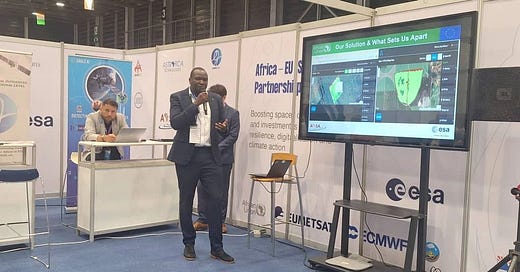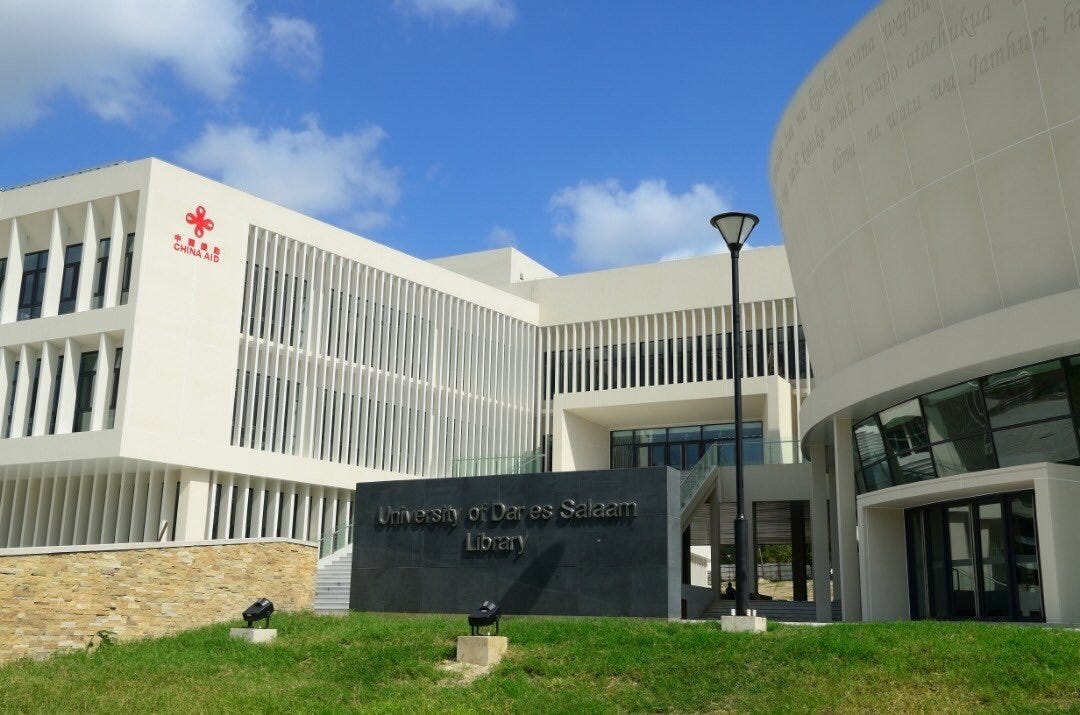This Week in Tanzanian Tech [May 4-10, 2025]
Satellite farming tools, cross-regional tech events, UDSM innovations
We’re back with the week that was.
In this edition, we explore:
Tanzanian farmers gaining access to space tech
How innovation discussions expanded beyond Dar to 15 regions
Students unveiling technologies spanning health, agriculture, and legal access
Plus five more updates.
1. Rada Launches Farm Monitoring Platform
First, some context.
Across Tanzania’s 33.8 million hectares of agricultural land, more than 8 million farming families make daily decisions that determine the nation’s food security and their livelihoods.
For most, detecting crop stress or nutrient deficiencies means physically walking fields, which is a time-intensive task when farming even modest plots.
On May 6, this centuries-old approach gained a powerful ally from space when Tanzanian startup Rada 360 launched its satellite-powered crop monitoring platform at Africa’s inaugural space technology summit in Abidjan, Cote d'Ivoire.
The company, selected as one of just ten African firms sponsored by the African Space Agency for the continental showcase, represents Tanzania’s entry into a field that could improve the country’s agricultural sector, which accounts for 27% of GDP and employs nearly 65% of the workforce.
The technology.
Rada Space transforms satellite imagery into practical field intelligence that Tanzania’s farmers desperately need.
The system produces detailed vegetation maps showing precisely where crops struggle within a field, allowing farmers to target their attention and resources with surgical precision rather than guesswork.
For a country where farmers can spend up to 30% of production costs on fertilizer—often applying it uniformly across fields regardless of soil conditions—the platform’s variable rate application maps could reduce input waste by targeting only areas with nutrient deficiencies.
“When a smallholder growing maize on three hectares can reduce fertilizer use by even 15% while maintaining yields, that represents money that goes directly to school fees, better housing, or farm expansion,” explains a regional agricultural officer who viewed the platform demonstration in Abidjan.
With over 75% of Tanzania’s rural households depending primarily on agriculture for survival, technologies that boost productivity while reducing costs address both economic and social challenges simultaneously.
Fact.
While satellite technology has existed for decades, high costs and technical complexity have kept it out of reach for African farmers.
Today, less than 2% of Tanzania’s arable land benefits from any form of precision agriculture, despite studies showing potential yield increases of 15-40% through optimized input use and early intervention against crop threats.
What’s ahead?
Rada 360 plans initial deployments to commercial farms managing at least 50 hectares, where the economics of precision agriculture show immediate returns.
However, the company’s longer-term mission targets Tanzania’s 4.5 million smallholder households through cooperative models that would allow farming groups to share access and costs.
If widely adopted over the next five years, satellite-guided farming could help Tanzania increase crop exports while reducing environmentally damaging fertilizer runoff into waterways.
For Mtwara’s cassava farmers, Morogoro’s rice growers, and Kilimanjaro’s coffee producers alike, access to space technology might finally deliver on agriculture’s elusive promise: producing more while using less.
2. IWTz Unites Ecosystem Under “Resilient and Inclusive Future” Theme
First, some background.
Innovation Week Tanzania (IWTz) has operated since 2015, with this year marking its 11th edition.
The gathering launched on May 12 at the Julius Nyerere International Convention Centre (JNICC), jointly organized by UNDP Tanzania through its FUNGUO Innovation Programme, Vodacom Tanzania, and the Tanzania Commission for Science and Technology (COSTECH), with support from the European Union (EU) and British Government.
The programming.
Anchored by Vodacom’s Future Ready Summit (FRS), the five-day agenda features sessions across three thematic areas: shaping smart and sustainable urban futures, youth empowerment in the digital era, and accelerating research commercialization.
Key discussions include “Building Innovation Ecosystems in Higher Learning Institutions,” showcasing the YouthIgnite Student Founders Fellowship, and “Positioning Tanzania as Africa’s Next Fintech Investment Destination.”
Fact.
The event extends nationwide through satellite activities in over 15 locations, including Dodoma, Arusha, Morogoro, Mwanza, and Zanzibar—organized by local innovation spaces and higher learning institutions.
What’s ahead?
The week continues through May 16 with exhibition booths from organizations like UN Women’s Binti Dijitali program offering digital advisory services.
Post-event roadshows will extend the Innovation Week experience to multiple regions across Tanzania.
These regional activities will encourage dialogue on local innovation ecosystems by bringing together government representatives, private sector leaders, academia, and development partners to ensure widespread impact beyond the main event.
3. UDSM Prepares Local Solutions for National Deployment
First, some context.
The University of Dar es Salaam (UDSM) operates seven colleges with a combined (undergraduate and postgraduate) student population of over 40,000.
This 64-year-old institution transformed its CoICT Kijitonyama campus into a technology showcase from May 5-7 for its 10th Research and Innovation Week.
Visitors moved through exhibition halls where students demonstrated how their creations solved specific Tanzanian challenges. This marked an evolution from last year’s event.
While 2024 focused on forming industry-academia partnerships, 2025 revealed what those collaborations produced: working technologies built for local conditions rather than theoretical concepts.
The experiences.
Attendees watched as law students connected a visitor to legal advice in minutes through their digital platform, addressing Tanzania’s persistent challenge of legal service access.
At the UDSM DHIS2 Lab booth, health officials saw how the AI-powered surveillance system could identify potential disease outbreaks from routine reports, potentially saving critical response time during epidemics.
Farmers gathered around the Hyalosustainers exhibit, examining the Hyalofert biofertilizer developed specifically for Tanzanian soil conditions, while nearby, visitors without smartphones tested how Rafiki AI delivered information through simple text messages.
Fact.
Unlike imported technologies that often fail in Tanzanian settings, these innovations addressed specific local constraints.
They can work with patchy internet connectivity, function on basic devices, and operate reliably even with inconsistent electricity supply.
What’s ahead?
As visitors left the exhibition halls, the conversation shifted from demonstrations to deployment.
The Youth for Children (Y4C) Innovation Hub’s LogiTrack system has already logged test routes with World Food Programme (WFP) vehicles, validating its effectiveness in challenging connectivity environments.
The Swahili text-to-speech (TTS) technology from 3D Solutions Lab showed how locally developed AI could make digital content accessible to more Tanzanians.
These technologies represent a crucial shift from importing solutions to building them locally—with deeper understanding of the specific challenges they aim to solve.
ADDITIONAL HEADLINES
Tanzanian Students Win Global Challenge
Kyoto University engineering student Alfaxad Eyembe and University of Wisconsin’s Mrina Mtenga secured first place among hundreds of entries in Google’s $150K “Unlock Global Communication” competition.
Their winning “Gemma 2 Swahili” project adapted Google’s open language models to serve 200+ million Swahili speakers.
They outperformed entries for Arabic, Italian, and Ancient Chinese languages, also recognized in the top five.
Tanzania Hosts Continental Digital Education Summit
Dar es Salaam just welcomed over 1,200 education and technology specialists for the three-day eLearning Africa conference ending May 9.
Discussions centered on making AI work in low-connectivity environments, building tech infrastructure for education access, and creating e-content in African languages.
This 18th annual gathering brought practical solutions rather than theoretical models, with Tanzania’s education ministry already committing to implement selected approaches in local schools.
TRÍ Expands Team
E-mobility startup TRÍ is recruiting a Finance Manager to oversee operations across Tanzania, Kenya, Ethiopia, Nigeria, and Germany.
The 9-person venture-backed company develops smart batteries, electric three-wheelers, and charging infrastructure designed for African markets.
TRÍ expects their new hire to:
Speed up how quickly money flows through the business
Ensure cash spent on production returns as sales revenue within 90 days
Guide the company toward profitability by mid-2026
Want to apply? Email you@growtri.io with your CV and a one-page explanation of a business metric you improved and how you did it.
Banks Win, Telcos Struggle
Digital banking apps drove a 13% jump in bank stock prices from January to March 2025 on the Dar es Salaam Stock Exchange (DSE), while telecom company shares barely moved.
DSE grew 7% overall, with the total value of all 28 listed companies reaching $7.3 billion.
Meanwhile, banks issued more personal loans as total lending grew 12.7%.
AI for TRA Affairs
Dar-based startup TaxCap has unveiled software that captures and digitizes the knowledge of Tanzanian accounting firms.
Priced from Sh12-24M+, each on-premise implementation creates a secure, unique AI assistant trained exclusively on one firm’s tax cases, working practices, and TRA regulations.
The technology acts as a consistency layer, helping junior and senior staff maintain service quality standards while handling more clients without additional hiring.
TaxCap AI also reduces routine consultation time by 70%.





